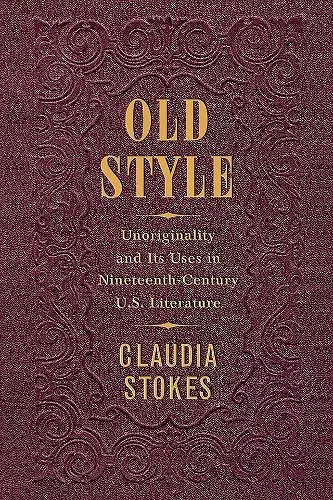Old Style
Unoriginality and Its Uses in Nineteenth-Century U.S. Literature
Format:Hardback
Publisher:University of Pennsylvania Press
Published:14th Dec '21
Currently unavailable, and unfortunately no date known when it will be back

We celebrate innovation and experimentation, but Claudia Stokes reminds us that nineteenth-century American writers instead valued familiarity and traditionalism, which provided reliable markers of literary quality. Old Style examines the varied uses and expressions of unoriginality, which helped credential marginalized writers.
An aesthetic of unoriginality shaped literary style and reader taste for decades of the nineteenth century. While critics in the twentieth century and beyond have upheld originality and innovation as essential characteristics of literary achievement, they were not features particularly prized by earlier American audiences, Claudia Stokes contends. On the contrary, readers were taught to value familiarity, traditionalism, and regularity. Literary originality was often seen as a mark of vulgar sensationalism and poor quality.
In Old Style Stokes offers the first dedicated study of a forgotten nineteenth-century aesthetic, explicating the forms, practices, conventions, and uses of unoriginality. She focuses in particular on the second quarter of the century, when improvements in printing and distribution caused literary markets to become flooded with new material, and longstanding reading practices came under threat. As readers began to prefer novelty to traditional forms, advocates openly extolled unoriginality in an effort to preserve the old literary ways. Old Style examines this era of significant literary change, during which a once-dominant aesthetic started to give way to modern preferences.
If writing in the old style came to be associated with elite conservatism—a linkage that contributed to its decline in the twentieth century—it also, paradoxically provided marginalized writers—people of color, white women, and members of the working class—the literary credentials they needed to enter print. Writing in the old style could affirm an aspiring author's training, command of convention, and respectability. In dismissing unoriginality as the literary purview of the untalented or unambitious, Stokes cautions, we risk overlooking something of vital importance to generations of American writers and readers.
"Claudia Stokes’s admirable Old Style possesses a number of what could be called old fashioned virtues: it is very well-written, impressively researched, and surprisingly generous to a number of largely forgotten or dismissed literary figures. The argument of Old Style, however, is nothing if not timely. Stokes makes a persuasive case for the need to reevaluate our belief in the value of originality....Old Style is imaginative, original, and unconventional." * Modern Philology *
"Claudia Stokes returns us to a moment when the derivative was not so easily dismissible-when imitation, iteration, and quotation held real cultural cachet. Considering writers both forgotten and familiar, she unfolds an utterly convincing case for the power of the unoriginal in the service of both progressive and conservative causes in the early United States. In so doing, she offers a beautifully researched, impeccably written, and manifestly important corrective to a whole raft of stories that we keep telling about the exceptionality of America and its artists." * William Huntting Howell, Boston University *
"Old Styleis the work of a literary historian, patiently, rigorously demonstrating that the nineteenth century is indeed a foreign country, where today’s precepts of 'novelty, surprise, and topicality' were a stigma, not an asset. We are therefore invited to reconsider whole swaths of books that we tend to find dull, repetitive, formulaic, and therefore unworthy of our consideration as readers, teachers, and scholars. What if, Stokes asks, repetition, secondariness, the compliance with formulas or conventions were dull only if we stick to the diktats of the new, and the often invisible exclusionary bias that goes with them...[W]e owe it to Stokes’s brilliant reconsideration of nineteenth-century literature as the locus of tradition and unoriginality. Few books so alter how and what we read. Claudia Stokes’sOld Styleis one of them." * American Literary History *
ISBN: 9780812253535
Dimensions: unknown
Weight: unknown
272 pages